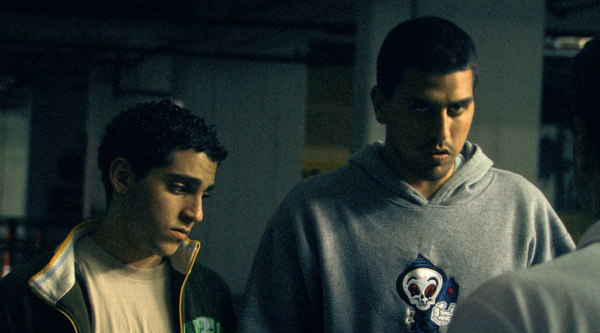|
Reviews of Recent Independent, Foreign, & Documentary Films in Theaters and DVD/Home Video

AJAMI Ajami is an old, mixed Arab/Jewish working-class section of Jaffa, the neighborhood just a few minutes south of downtown Tel Aviv. The film Ajami, a gripping, gritty tragedy, follows the intersection of several complex familiesópoor and entrepreneurial Arab Israeli citizens who are Muslim, Christian, or Bedouin; illegal Palestinians; as well as Jews. Their lives cross at the wrong place at the wrong time, with misunderstood intentions and prejudicial attitudes that sadly lead inexorably to violence. Each of the five chapters starts with a different point of view. As the film moves forward, additional revelations from different angles change the audienceís understanding of events, though very confusingly on first viewing. The prologue introduces the 13-year-old narrator, Nasri (Fouad Habash), a talented draftsman, as he illustrates how his beleaguered family fell into a dangerous feud with a clan of Bedouins. In chapter one, his 19-year-old brother Omar (Shahir Kabaha) has been forced into the role of family elder against the revengeful Bedouins, but he refuses to flee or hide. Seeking a settlement, both families head south to a Bedouin judge, and in this intriguing look mediation, the negotiations donít favor a poor, fatherless family against a powerful clan The judge pronounces that Omarís family owes shekels, a lot of them, but they donít have the cash. The second chapter takes us further behind the scenes at the restaurant where Omar works, owned by the wily Abu Elias (Youssef Sahwani), seen mostly from the even more powerless perspective of16-year-old Malek (Ibrahim Frege). He illegally crossed the border from the Palestinian Territories to earn money for an expensive, life-saving bone-marrow transplant for his mother. (Pathos is laid on thick when she sends him a video of her frail birthday greeting from her hospital bed.) Another dispute between neighbors quickly escalates from an argument to violence, but this time a Jew is killed so the police are called in, and the third chapter follows Israeli cop Dando (Eran Naim). The resulting overtime not only cuts into his loving home life with his wife and toddler, but also from his interminable search for his brother, who is missing after finishing his army service. Pursuing all possibilities, Dandoís frantic family asks for help from the Ultra-Orthodox community just in case the missing brother suddenly became religious, as if taken in by a cult. Here the film strains to incorporate as many faces of Israel as possible. Chapter four whirls back a bit disjointedly in time to focus back on the restaurant, particularly on the debonair cook Binj (co-director Copti). All he wants is to party with a line of coke and to move in across town with his Jewish girlfriend, to the disdain of his Arab friends. The concluding section whirls again to the perspective of the wealthy, manipulative restaurateur Abu Elias, seen as a benevolent despot at home and work. (The inevitable Romeo-and-Juliet element is played out behind his back between his daughter, a Christian, and the Muslim Omar.) Accidents donít just happen as politics are pushed aside for the intensely personal. The two new
Israeli co-directing filmmakers, Yaron Shani, a Jew, and Scandar Copti,
a Palestinian, surmount the Crash-like coincidences through the
realistic improvised dialogue and interactions of the many
nonprofessional actors whose life-stories were matched to the
characters, creating a similar feel to how
Fernando
Meirelles and
KŠtia Lund
integrated their nonprofessional castís experiences into City of God.
Going beyond the usual stereotypes to expose human fault lines, Ajami
vividly provides a wrenching immersion into how tinderbox tensions
in Israel can too easily explode.
Nora Lee Mandel
|

